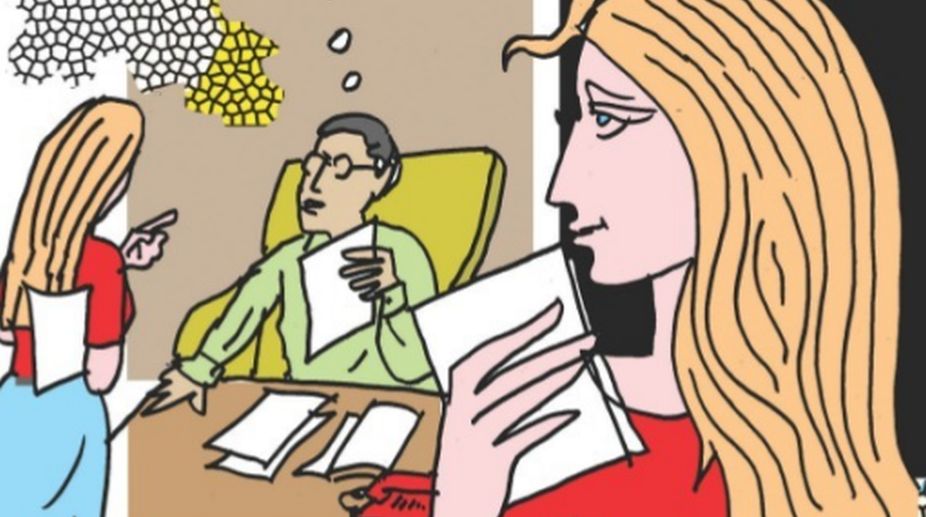Can your job be a reason for your obesity?
Another factor that has been fast-tracked with the onset of the work-from-home norm would be a rapid spike in online food delivery, which led to an overall change in dietary behaviour.

“When do I see you again?”
“I am not quite sure.”
“Have you completed the papers the consulate has sent you.”
Advertisement
“I will get around to those this week.”
“Please do. Those are essential for the visa.”
I had been busy and my life seemed full. I had a demanding corporate job, managed a nonprofit in the evening and taught part-time in the university. Also, I edited a literary journal, wrote columns for a professional magazine and did serious photography. I rowed early morning and partied late evening.
In walked an intruder, least expected. She spoke softly and smiled often. Her boss, a close friend, wanted me to help her with a project she was supervising. We worked together but soon found each other more interesting than the work. My work and my writing went on the back burner and the parties began to seem lacklustre. I longed to be with her.
The next eighteen months, carefree and joyous, passed quickly. The freshfaced, gentle-eyed woman, who had walked so unceremoniously into my life, was now to leave it just as unceremoniously. Her project was nearly done; the deadline for her overseas report was approaching fast, in a far-off US university; her parents in Minnesota wanted her back for Christmas. Disconcertingly, definitively, a friendly police officer told me her visa, extended twice already, would not have a period of grace.
“Would you like to come with me to the US, for a short visit?”
“But your parents want you with them.”
“You could come with me.” “Don’t you have your project report to finish?”
“All right, all right.”
I couldn’t get any leave at the time, in any case. Off she went, alone, back to the US, her parents and her university.
She quickly submitted an application for a visa for me. The local consulate sent me the papers. It was a complicated affair and I shrank from the task. She persisted and called me to urge completion.
Then she went a step further. She went to her Senator, who chaired the committee dealing with immigration. The next thing I knew I had a call from the US Consul, “Please come and see me tomorrow.” The forms were done in ten minutes. The Consul waived the requirement for documents I didn’t have. The visa arrived in a week.
Now began a frantic race against the clock. I had to persuade my company to let me go, without the required notice. The non-profit organization I had painstakingly built had to be left with a friend. There was no time to sell my home; I just handed the key to my brother and the furniture to people who wanted them, at a price or at no price. My books went to a library, my clothes to a charity, my music collection to friends. I did not close the bank account, for the prevailing exchange control meant I couldn’t exchange my rupees for dollars.
“When do you leave?”
“I don’t know yet. Trying to get some dollars.”
“Don’t worry about it. Just come, please.”
“I don’t want to arrive and panhandle!”
“You won’t have to. Come quickly.”
My parents came to see me off at the airport. They waved from a balcony as I treaded the tarmac to board the plane. I was leaving the place I knew, the people I loved, for a distant land and unknown future. I did not have the reassurance of a promised job or even a padded wallet.
The aircraft was crowded, the flight painfully long. My short seatmate sat sullenly and drank wordlessly. That left me alone with my uncertain thoughts.
The plane stopped at Dulles International Airport with a sharp jolt. A warm, sultry July afternoon greeted us. I jostled ahead with a motley crowd of summer tourists, getting into lines, going up and down stairs, riding on escalators, showing papers, answering questions, and finally entering the lounge.
Around me people were greeting people, talking, laughing, hugging. My sullen seatmate, smiling broadly, held the hand of a little boy. Amid the hubbub, I stood aside, tired, lost, expectant.
And, then, there was a sudden swirl of long blonde hair, a familiar flash of glimmering blue eyes, a dizzy blur of the world’s sweetest sounds, smells and sensations. Next moment, the bright overhead lights of the airport were going round and round, as were a pair of slender arms around my neck. Found! I was no longer tired or lost: I was home, I was home.
The writer is a Washington-based international development advisor and had worked with the World Bank. He can be reached at mnandy@gmail.com
Advertisement